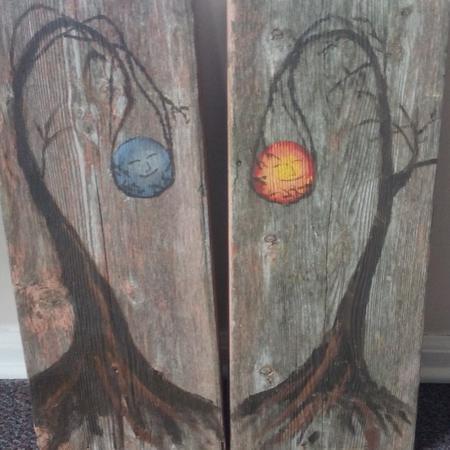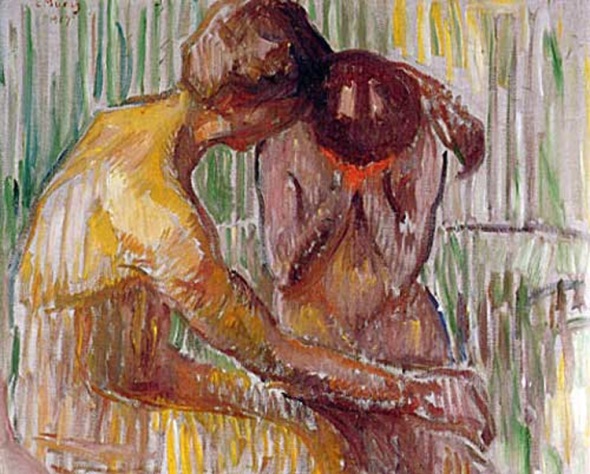13 Synonyms for Contentment That Don’t Mean the Same Thing at All
22February 7, 2016 by Paula Reed Nancarrow
Last week we went to the dictionary – more precisely, to Google’s summary of all things dictionary-ish – to get a definition of contentment.
As a part of that definition, we got thirteen synonyms: satisfaction, gratification, fulfillment, happiness, pleasure, cheerfulness, ease, comfort, well-being, peace, equanimity, serenity, and tranquility. But as any eighth grader trying to impress her English teacher by a heavy-handed employment of Roget’s Thesaurus knows, synonyms are slippery things.
Some synonyms mean almost exactly the same thing, and are essentially interchangeable. Linguists call these “cognitive synonyms.” The others are “near synonyms.” They may be only synonyms within a certain context. They may have overlapping meanings. Or they may “feel” different.
The denotations and connotations of language give us the richness of poetry, of multivalent meaning.
They allow for metaphor, euphemism, puns. But when you are trying to explore a concept like contentment, synonyms can be, at least initially, frustrating. Because some of them undermine each other, if not cancel each other out, depending on where you stand.
The discussion of contentment on synonyms.net, the “world’s largest resource for synonyms and antonyms” makes an interesting distinction between gratification and satisfaction: “Gratification is the giving any mental or physical desire something that it craves; satisfaction is the giving such a desire all that it craves.”
But can lasting contentment be a product of having cravings and desires met? Has that been your experience? It certainly hasn’t been mine.
Fulfillment is defined by Google Search as “satisfaction or happiness as a result of fully developing one’s abilities or character” or “the achievement of something desired, promised, or predicted.” Here is the word, used in a sentence: “She did not believe that marriage was the key to happiness and fulfillment.”
In fact we seem to know a heck of a lot more about feeling unfulfilled – at work, or in our relationships – than we do about “fully developing one’s abilities or character.” What we mean by fulfillment, moreover, changes over our lifetime. I will come back to this later in the year.
The most frequently use synonym for contentment – at least in my library’s card catalog – is happiness, “the state of being happy.”
Happy, in turn, is “feeling or showing pleasure or contentment.” That is, when happy is not in its “lucky” iteration, denoting something fortunate or convenient. How helpful is that? Not much. Synonyms.net distinguishes happiness as “the positively agreeable experience that springs from the possession of good, the gratification or satisfaction of the desires or the relief from pain and evil.” Again, we are back to possessing, to having desires met, to having pain relieved.
That’s contentment? Really?
Then there is pleasure, that sybaritic word: “an arousing of the faculties to an intensely agreeable activity.” OK. Arousal means a lot of things to me, but it seldom means contentment. Afterglow, maybe. But again we are in the realm of gratification and satisfaction. Not that that isn’t a nice place to be.

Photograph attributed to Chris Craymer via Notorious
Cheerfulness isn’t really a synonym of contentment at all.
It’s more like a concurrent condition. “When someone is content, they are generally also in good spirits, noticeably happy and optimistic.” And this tends to be contagious; a cheerful person can buoy someone else’s spirits, just as cheerful surroundings or cheerful music can brighten a mood.
Ease is the absence of difficulty or effort. I would love it to be true that this is a synonym for contentment because then I could effortlessly be content, easy peasy. But actually it is closer to being a synonym for relaxed, which is another one of those words that is defined by what it’s not: “freedom from anxiety or tension.”
With the exception of its use as a synonym for console, comfort too is a word related to the absence of pain, annoyance, or trouble. “Comfort may be almost wholly negative, being found in security or relief from that which pains or annoys; there is comfort by a warm fireside on a wintry night; the sympathy of a true friend affords comfort in sorrow.
Even peace is often defined by negatives: freedom from disturbance, the absence of war.
The “peace that passes all understanding” might be said to be a Christian synonym for contentment, but the well-known phrase from Philippeans also has an element of protective vigilance to it: Paul promises it will “guard your hearts and minds.” Police officers are said to help “keep the peace.” Most of the time when we talk about peace, we are talking about safety and security. Necessary conditions for contentment for most people, but not the same thing.
On the other hand, there’s equanimity – mental calmness, composure, and evenness of temper, especially in a difficult situation – and its near synonyms, serenity – “the state of being calm, peaceful, and untroubled” and tranquility “the quality or state of being calm.” Equanimity seems the most like an active state to me, something you actually do. A person might be said to practice serenity as well. But tranquility feels more passive.
Well-being is defined as “the state of being comfortable, healthy, or happy.” If that is what well-being means, then I could argue that’s not strictly a synonym for contentment either – although a state of contentment might produce well-being.
Most of these words feel like a fascinating set of distractions to me.
They are paths to explore that don’t really take me in the direction I was hoping to go. Synonyms or not, none seem to me to capture that essential quality of contentment: that it is not a an emotion at all, but a state of awareness and a skill to be practiced.
In other words, an art.

Wall Art, “Contentment.” Found on varagesale.com





I loved this. To me, to be content you must go through is a process- something I want to achieve. It isn’t settling. It’s happiness and acceptance and thoughtfulness and comfort and serenity and determination all wrapped up in one calm sounding word.
I really can’t think of a appropriate synonym either.
LikeLiked by 1 person
Ugh. I sent too soon. But my point still shines through. :)
LikeLike
Yes indeed it does, ma’am. Thank you for pushing the button. Twice. ;-)
LikeLiked by 1 person
i like your article, very inspiring, thank you for your post
LikeLike
You are welcome!
LikeLike
Paula, you are onto something! ‘Art of Contentment’! I did a quick Google search on the ‘art of contentment’ but I the initial search did not give me what I was looking for. I like the phrase. Art to me means its flowing, changing with whatever is going on in our hearts, minds or spirit, balancing it all. … I keep reading your journey with great interest. :)
LikeLike
Thank you Kate. I read my journey with interest as well, as I am not always sure where I am going. The folks who comment help me figure it out… ;-)
LikeLike
Cor! I love this swim through the meaning of a single word. And I do agree, for me contentment is an art that comes of letting go the fight of youth and within that it is therefore not all positive. 😐
LikeLike
It’s kind of a murky swim, but I figure you have to start somewhere. Yes, I seem to be using the term “mixed bag” a lot these days. I used to get a little upset that the word “poignant” was applied to my writing so often – I thought it akin to sentimental, but when I looked it up the definition was something like “containing an equal measure of good and bad feeling.” Which struck me as just plain honest, then, and I felt better. That’s the way a lot of life is.
LikeLiked by 1 person
Yes, an art. I feel what I call contentment–or a definition of it–when I’m not striving for or trying to escape anything. The Dalai Lama comes to mind. I first met him in 1979, so have some history with his ability to remain calm, positive, cheerful, and open. He has more to accomplish than anyone can and he’s 80. He has a serious prostate gland condition which requires daily medical treatment. He’s lost his country, gained a celebrity status that would make most people nuts, and so, so many people lean on him while the Chinese would like to do him in. He still has time to meditate, pray, and study every day, and in his latest Tibetan New Year’s greeting to assure Tibetans that his health is nothing to worry about, he radiates contentment. I’ll have some of that, please.
LikeLike
I am listening right now to one of the Art of Happiness books Howard Cutler wrote with The Dalai Lama which – though they seem to be becoming something of an industry – is still pretty good. I like the balance of eastern spirituality and western science, though I sometimes feel like trying to make Tibetan Buddhism accessible to Westerners is secularizing something which has a greater power in its sacred context. But I would love to have some of what he’s got. Although I may be too much of a baby to handle it. Certainly getting up at 3:45 a.m. in the morning to meditate is not going to happen anytime soon.
LikeLike
I admire your intellect and tenacity, and I enjoy your subtleties, but I’m just going along on the journey with you. This made me think too much:)
LikeLike
Yeah. Me too. That’s why I thought this week’s would be “just a story.” Unfortunately (or fortunately), that made me think even more.
LikeLiked by 1 person
I like the peace part – it is an absence of war… OMG. But it’s true. When you think of it smile became an absence of anger face😐
LikeLike
More on peace in this week’s post. Somewhat accidentally. ;-)
LikeLike
Great post. I tend to stick with the Buddhist description of contentment – which is looking inside oneself and not basing happiness on fleeting or transient ideas of happiness or pleasure.
LikeLike
Yup. I liked this explanation: “Contentment (santuññhi) is the ability to be happy and fulfilled in one’s present state. The Buddha said: `Contentment is the highest wealth’ (Dhp.204), meaning that when we are content we do not need to get anything, go anywhere or be anything to be happy because we already are, and thus, contentment is more valuable than any possession or accomplishment.” http://www.buddhisma2z.com/content.php?id=83#sthash.9yJGnce2.dpuf
Maybe I should not be searching for contentment in its synonyms. Maybe I should be searching in the sangha.;-)
LikeLiked by 1 person
Another great post, Paula. And I agree that the wall art describes “contentment” best.
LikeLike
Thank you, ma’am. That piece was a delight to find. Since when I went to the page it was “sold,” I assume it is contentedly gracing someone’s home somewhere.
LikeLike
[…] that problematic word “peace” again – the one we discussed last week. In the first line it is fits neatly into the dictionary definition – “freedom from […]
LikeLike
For me contentment is a choice. The apostle Paul said that he had learned to be content in any state he was in, and those were not always pleasant states. I think contentment is more an attitude than an emotion. Happiness, peace, and some of those other synonyms seem to be byproducts of contentment. Satisfaction and gratification don’t seem to me like synonyms at all.
LikeLike
We’re on the same page there..or at least close. Most of the time I think it is a conscious choice, one we can become more skilled at making with practice. I have, however, had those experiences that hit me broadside as moments of grace.
LikeLike